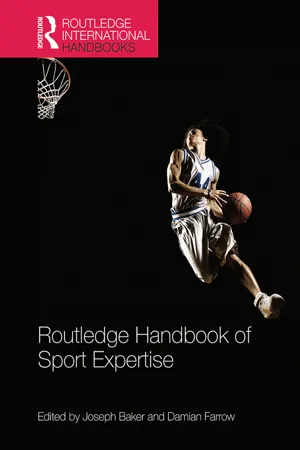
- 454 pages
- English
- ePUB (mobile friendly)
- Available on iOS & Android
Routledge Handbook of Sport Expertise
About this book
Understanding and developing expertise is an important concern for any researcher or practitioner working in elite or high performance sport. Whether it's identifying talented young athletes or developing methods for integrating cutting-edge sport science into daily coaching practice, scientists, coaches and researchers all need to understand the skills, characteristics, and knowledge that distinguish the expert performer in sport.
The Routledge Handbook of Sport Expertise is the first book to offer a comprehensive overview of current research and practice in the emerging field of sports expertise. Adopting a multi-disciplinary, multi-faceted approach, the book offers in-depth discussion of methodological and philosophical issues in sport expertise, as well as the characteristics that describe sporting 'experts' and how they can be facilitated and developed. Exploring research, theory and practice, the book also examines how scientists and practitioners can work together to improve the delivery of applied sport science.
With contributions from many of the world's leading researchers in expertise and skill acquisition in sport, the Routledge Handbook of Sport Expertise is important reading for any advanced student, researcher, coach or sport science support officer looking to better understand this cutting-edge topic.
Frequently asked questions
- Essential is ideal for learners and professionals who enjoy exploring a wide range of subjects. Access the Essential Library with 800,000+ trusted titles and best-sellers across business, personal growth, and the humanities. Includes unlimited reading time and Standard Read Aloud voice.
- Complete: Perfect for advanced learners and researchers needing full, unrestricted access. Unlock 1.4M+ books across hundreds of subjects, including academic and specialized titles. The Complete Plan also includes advanced features like Premium Read Aloud and Research Assistant.
Please note we cannot support devices running on iOS 13 and Android 7 or earlier. Learn more about using the app.
Information
Table of contents
- Cover
- Half Title Page
- Title Page
- Copyright Page
- Table of Contents
- List of figures
- List of tables
- About the contributors
- 1 A [very brief] review of the historical foundations of sport expertise: an introduction to the Handbook
- 2 Expert anticipation and pattern perception
- 3 Aiming for excellence: the quiet eye as a characteristic of expertise
- 4 On attentional control: a dimensional framework for attention in expert performance
- 5 Information-movement coupling as a hallmark of sport expertise
- 6 How experts make decisions in dynamic, time-constrained sporting environments
- 7 Movement automaticity in sport
- 8 Expertise in the performance of multi-articular sports actions
- 9 Breadth and depth of knowledge in expert versus novice athletes
- 10 Psychological characteristics of expert performers
- 11 Physical qualities of experts
- 12 Expert performance in sport: an ecological dynamics perspective
- 13 Defining expertise: a taxonomy for researchers in skill acquisition and expertise
- 14 Issues in the collection of athlete training histories
- 15 Issues in the measurement of anticipation
- 16 Eye tracking methods in sport expertise
- 17 New methods for studying perception and action coupling
- 18 Methods for measuring pattern recall and recognition in sport experts
- 19 Capturing group tactical behaviors in expert team players
- 20 Methods for measuring breadth and depth of knowledge
- 21 Measuring psychological determinants of expertise: dispositional factors
- 22 Psychological determinants of expertise: emotional reactivity, psychological skills, and efficacy
- 23 Issues in the measurement of physiological and anthropometric factors
- 24 Issues and challenges in developing representative tasks in sport
- 25 Challenges to capturing expertise in field settings
- 26 Genomics of elite sporting performance
- 27 Diversification and deliberate play during the sampling years
- 28 Psychological characteristics and the developing athlete: the importance of self-regulation
- 29 Family and peer influences in the development of sport expertise
- 30 Deliberate practice in sport
- 31 Development of tactical creativity in sports
- 32 Birthdate and birthplace effects on expertise attainment
- 33 Career length, aging, and expertise
- 34 Changing role of coaches across development
- 35 The use of observation as a method to develop expertise in coaching and officiating
- 36 Five evidence-based principles of effective practice and instruction
- 37 Efficacy of training interventions for acquiring perceptual-cognitive skill
- 38 The future of sport expertise research: barriers and facilitators in theory and practice
- Index